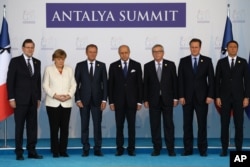President Barack Obama says it would be a mistake to deploy ground forces to defeat Islamic State militants, resisting calls at home and abroad for a more forceful U.S. strategy in the wake of Friday’s terrorist attacks in Paris.
Capping the two-day G-20 summit in this Mediterranean resort, the U.S. leader held a news conference at which he called the Islamic State terrorist group “the face of evil,” and said there would be an intensification of efforts but not a new strategy.
Obama said the Paris attacks were a "terrible and sickening setback" in the fight against IS, but he ruled out deploying large numbers of U.S. ground troops.
“It is not just my view but the view of my closest military and civilian advisers that that would be a mistake.”
Obama indicated he wants to avoid a repeat of the U.S.-led war in Iraq. “Not because our military could not march into Mosul or Raqqa or Ramadi and temporarily clear out ISIL, but because we would see a repetition of what we have seen before,” he said.
*Watch Obama's press conference at G-20
IS is 'Not Contained'
But Senator Dianne Feinstein, a member of the president’s own party, expressed grave concerns on U.S. television Monday about the current strategy in Iraq.
“I have never been more concerned. I read the intelligence faithfully. ISIL is not contained. ISIL is expanding. They've just put out a video saying it is their intent to attack this country.”
Feinstein said it is clear that limited airstrikes and support for Iraqi forces are not “sufficient to protect our country and our allies.”
She said she hopes France will pursue an Article 5 and bring in NATO. Article 5 is the part of the NATO treaty that says an armed attack on one member state is an armed attack on all.
“There's only one way we are going to diminish them and that is by taking them out, because they are growing. They are in more than a dozen countries now.”
Republicans in Congress have been urging for some time a bigger pushback against IS, but Feinstein is a Democrat, and as vice chairman of the Senate Intelligence Committee, she is a leading voice on foreign affairs.
Ending wars
But Obama said any new strategy would have to be sustainable.
“Let’s assume that we were to send 50,000 troops into Syria. What happens when there’s a terrorist attack generated from Yemen?” asked Obama. “Do we then send more troops into there? Or Libya, perhaps? Or if there’s a terrorist network that’s operating anywhere else - in North Africa, or in Southeast Asia?”
In a final statement, the G-20 leaders vowed to increase intelligence sharing, tighten their national borders and attempt to cut off terrorist funding in the aftermath of the attacks in Paris.
However, more consensus among the world leaders won’t be easy, according to Heather Conley, the director of the Europe Program for the Center for Strategic and International Studies.
“The parties have very different agendas. The Russian government wants to keep [Syrian leader Bashar al-] Assad in power and fighting the Syrian opposition; the U.S. is supporting the Syrian opposition and the Syrian Kurdish forces; Turkey is working against the Syrian Kurdish forces - I mean the complexity here is extraordinary,” she said.
The U.S.-led anti-Islamic State coalition has seen victories on the ground in recent weeks in Sinjar, Iraq and al-Hawl, Syria. The coalition also provided a symbolic blow to the terror groups' recruiting efforts last week with a drone attack that reportedly killed Jihadi John, the public face of the group.
“Have we done damage to ISIS? Yes. Have we stopped them from expanding? The answer is yes to that as well – at least generally. But winning, not yet,” Anthony Cordesman, for the Center for Strategic and International Studies, told VOA Monday.
Cordesman says winning will require some degree of global unity against the extremists.
Talks on Syria
U.S. and Russian leaders appeared to put aside many of their differences and made headway on plans for a cease-fire and an eventual transfer of power in Syria. Obama and Putin met twice on the sidelines of the summit, building on progress the two sides made at talks on Syria in Vienna over the weekend.
Obama also met with leaders of Saudi Arabia, Turkey, and Western European nations – all of them key players in international efforts to end the Syrian conflict, which has become a source of terrorist activity and triggered a massive exodus of refugees into Europe.
But talk is not enough for France, which has carried out at least 20 airstrikes on the Islamic State group’s main stronghold in Raqqa, Syria in the days since the attacks in Paris that killed at least 129 people.
“One cannot be attacked harshly, and you know the drama that is happening in Paris, without being present and active,” said French Foreign Minister Laurent Fabius, attending the summit in place of President Francois Hollande.





